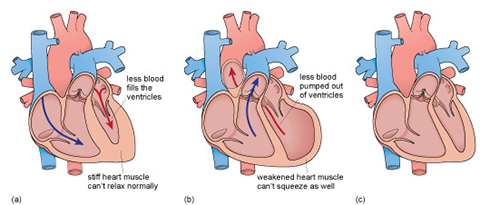2.1.2 Alcohol and cardiovascular disease
The relationship between the consumption of alcohol and heart function is complex. There is a large amount of evidence that long-term excessive alcohol consumption increases the risk of developing cardiovascular disease, but a few studies have suggested that drinking a moderate amount of alcohol may be beneficial for the heart.
Excessive alcohol consumption can raise blood pressure. Constant high blood pressure (or hypertension) means the heart works harder to pump blood into the arteries. In some people this causes the muscular wall of the left ventricle of the heart to grow and thicken. As a result, the heart then cannot relax normally between beats, so it becomes difficult to fill the heart with enough blood to supply the body’s organs, especially during exercise.
Heavy drinking can also weaken the heart muscle in some people, causing a condition called alcoholic cardiomyopathy. A weakened heart cannot contract effectively and, in some cases, the blood flow shortage resulting from this can damage organs and tissues. The heart itself will start to swell to hold the blood that cannot be efficiently pumped back out of the left ventricle. In this case blood pressure rises as a response to compensate, and so alcoholic cardiomyopathy can bring about other health conditions caused by raised blood pressure, such as stroke.
Either of these conditions (heart muscle weakening or heart muscle thickening) can eventually bring on heart failure (as illustrated in Figure 5). Symptoms of heart failure include shortness of breath, fatigue and swelling of the tissues because blood backs up trying to get into the heart and fluid can’t move into the blood.

Over the past few decades, several studies have suggested that moderate alcohol consumption has health benefits, including reducing the risk of cardiovascular disease and type II diabetes. Scientists have suggested two possible mechanisms for the protective effect on the circulatory system. Firstly, alcohol appears to increase the level of ‘good’ cholesterol (HDL) in the blood, which may reduce the amount of fatty deposits on the walls of arteries. Secondly, alcohol can reduce the production in the liver of a protein called fibrinogen which is involved in blood clotting. Both of these effects may reduce the risk of blocked arteries.
However, the picture is currently unclear. While moderate amounts of alcohol appear to be protective for people over 45, the pattern of alcohol consumption is probably more important than the amount consumed, or the length of time of consumption. In addition, other factors seem to moderate the risk of developing cardiovascular disease such as lifestyle (diet) and genetic inheritance.
